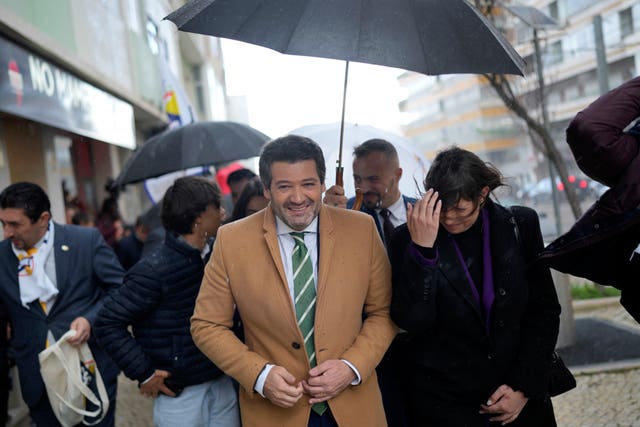
The official two-week campaign period before Portugal’s early general election began on Sunday, with the country’s two moderate mainstream parties once again expected to collect the most votes but with the expected rise of a populist party potentially adding momentum to Europe’s drift to the right.
The centre-left Socialist Party and centre-right Social Democratic Party have alternated in power for decades.
But they are unsure of how much support they might need from smaller rival parties for the parliamentary votes needed to form a government after the March 10 vote.
Corruption scandals have cast a shadow over the ballot.
They have also fed public disenchantment with the country’s political class as Portugal prepares to celebrate 50 years of democracy, following the Carnation Revolution that toppled a rightist dictatorship on April 25 1974.
The election is being held after a Socialist government collapsed last November following a corruption investigation.
That case brought a police search of prime minister Antonio Costa’s official residence and the arrest of his chief of staff.
Mr Costa has not been accused of any crime.
Also in recent weeks, a Lisbon court decided that a former Socialist prime minister should stand trial for corruption.

Prosecutors allege that Jose Socrates, prime minister between 2005-2011, pocketed around 34 million euros during his time in power from corruption, fraud and money laundering.
The Social Democratic Party has also been tainted by corruption allegations.
During the recent weeks of unofficial campaigning, a corruption investigation in Portugal’s Madeira Islands triggered the resignation of two prominent Social Democrat officials.
The scandal erupted on the same day the Social Democratic Party unveiled an anti-corruption billboard in Lisbon that said: “It can’t go on like this.”
A housing crisis, persistent levels of low pay and unreliable public health services are other areas where the records of the two main parties are at issue.
Hot-button topics that have driven political debate and encouraged populist parties elsewhere in Europe, such as climate change, migration and religious differences, have largely been absent in Portugal’s campaign.
A five-year-old populist and nationalist party called Chega! (in English, Enough!) has made the fight against corruption one of its political banners.
“Portugal needs cleaning out,” one of its billboards declares.
The party’s leader, 41-year-old lawyer Andre Ventura, has been riding in third place in opinion polls and could become a kingmaker if his political influence grows.
His party got just 1.3% of votes in a 2019 election, but jumped to 7.3% in 2022.
It could collect more than double that this time, polls suggest, if a protest vote materialises.
A key question is whether the Social Democrats will end up needing the votes of Chega! to make up a parliamentary majority after eight years in opposition.
The Socialist Party could, as in the past, forge parliamentary alliances with the Portuguese Communist Party or Left Bloc party to take power.
Socialist leader Pedro Nuno Santos, his party’s candidate for prime minister, is a politician and a former minister for housing and infrastructure.
Mr Santos, 46, quit the previous government under a cloud over his handling of bailed-out flag carrier TAP Air Portugal and a dispute over the site of a new Lisbon airport.
Luís Montenegro, the 51-year-old Social Democrat leader aiming to become prime minister, has been a politician for more than 20 years.
He heads the Democratic Alliance, a grouping with two smaller right-of-centre parties formed for the election.

Enjoy the convenience of having The Sunday Post delivered as a digital ePaper straight to your smartphone, tablet or computer.
Subscribe for only £5.49 a month and enjoy all the benefits of the printed paper as a digital replica.
Subscribe